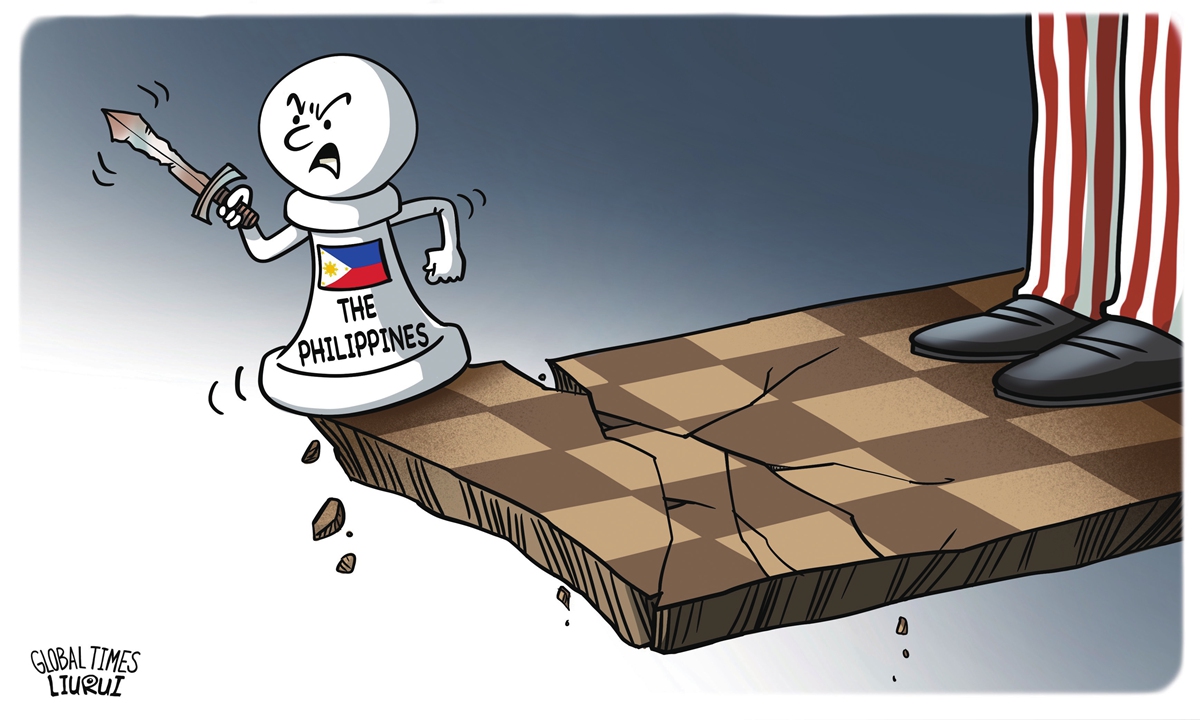
Illustration: Liu Rui/GT
During his recent visit to India, Philippine President Ferdinand Marcos Jr made highly provocative remarks regarding the Taiwan question. He claimed that if a confrontation occurred over the Taiwan question, "there is no way that the Philippines can stay out of it," "if there is an all-out war, then we will be joined into it." And his excuses were "physical geographic location" and "large volume of Filipinos working in Taiwan," framing it as a humanitarian concern. He claimed he would mobilize everything he could to bring their people out.
This statement aligns with Manila's recent actions on the Taiwan question, revealing the Philippines' true intent: to actively involve itself, curry favor with the US, and mask its political calculations to get involved in the Taiwan Question under the disguise of "humanitarian concerns."
The Philippine government has once made serious commitments to China that it adheres to the one-China policy, recognizes that Taiwan is an inalienable part of the Chinese territory and understands the Chinese government's efforts to realize national reunification. The Philippine leader also said clearly to China that the Philippines is committed to the one-China policy, and the Taiwan question is purely China's internal affair that must be solved by the Chinese people. These pledges constitute not only the political foundation of China-Philippines relations, but also an essential premise for maintaining mutual trust between the two countries on sensitive issues.
Manila has not only betrayed its promises, but have repeatedly escalated its substantive moves on involving itself in the Taiwan question. Last year, the Philippines nearly doubled the number of military bases opened to US forces, including three facing Taiwan island. In April this year, it eased restrictions on interactions with officials of Taiwan authorities, including allowing Philippine officials to visit the island. Later, the Philippines and Taiwan authorities discussed about conducting joint patrols in the Bashi Channel, and in late July, the two sides negotiated an agreement concerning the facilitation of cooperation on law enforcement in fisheries matters and pledged to implement the one-hour advance notification mechanism. An article in The Washington Post this July stated that security cooperation between the Philippines and Taiwan island is "further along than publicly disclosed." The latest public remarks by the Philippine leader in India sent an even more dangerous signal of a deliberate attempt to stir up tensions in the Taiwan Straits, undermining the political foundation of China-Philippines relations.
The shift in stance on the Taiwan question was not a passive reaction by Manila, but a deliberate, proactive design. Manila is aware that the Taiwan Straits is one of US' most sensitive strategic focuses. When selling instability in the South China Sea can no longer attract significant attention, signaling involvement in the Taiwan Straits allows Manila to further assert its "strategic value" and secure greater security assistance and political support from the US.
Recently, US media reported that "the Philippines is quietly working with Taiwan" to counter the Chinese mainland. Even third parties can clearly see this new tactic, yet the Philippines still tries to "feign innocence" on the international stage. The so-called "humanitarian" rhetoric of protecting overseas nationals is merely a cover, covering up its line-crossing behavior and aggressive strategy in humanitarian language. Manila's claim that its "greatest concern" is the evacuation of Filipino nationals in Taiwan. Such attempt is to signal its pro-US strategic stance, but also for creating public opinion space in advance for future coordination with US forces regarding port and airspace usage. If the Philippines were truly concerned about the safety of its nationals, it should promote regional peace and stability, rather than making high-profile declarations at international forums that it "cannot stay out of it," let alone bind itself to a potential military confrontation. The Philippines' military deployments in the north, the opening of bases, and multilateral military exercises with the US and Japan clearly have nothing to do with humanitarian concerns but are closely linked to intervention in the Taiwan Straits, the containment of China, and jeopardize regional peace and stability.
The "no way to stay out of it" claim fails to convey Manila's innocence or passivity. On the contrary, it exposes its deliberate efforts to create preemptive friction. The Philippines is located at the southern end of the Taiwan Straits - a geopolitically sensitive position, which is an objective fact. But the level of risk is not entirely determined by geography; there is no predetermined geopolitical destiny for the Philippines. The key lies in its own choices. Right now, Manila is pushing itself toward the frontlines of a potential conflict through actions that betray trust and good faith. This kind of reckless provocation also undermines the peace and stability that the region holds most dear, violates the ASEAN Charter and the expectations of regional peoples, and increases the risk of overlapping tensions in both the South China Sea and the Taiwan Straits.
Manila must face reality. The Taiwan question is China's internal affair and represents the core of China's core interests. The Philippines' justification for intervention based on "geographic location" and "the large volume of Filipinos working in Taiwan" is untenable and will never be accepted by China. The more it provokes on this issue, the more it puts itself in danger and loses the opportunity to maintain constructive relations with all parties. If Manila keeps going on the path, he so-called "no way to stay out of it" will become a self-fulfilling prophecy - the Philippines could very well become the next flashpoint and a troublemaker igniting regional instability.



